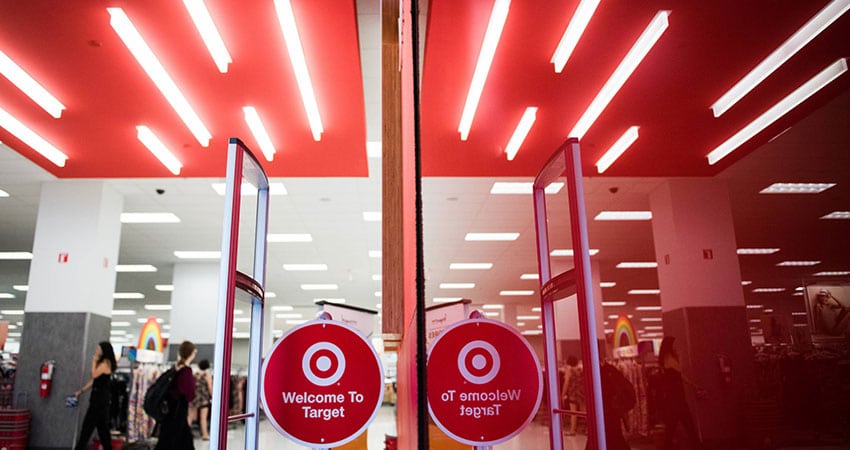Target joined fellow retail bellwethers Walmart, Home Depot and Amazon in warning about softness in consumer demand for 2023 as it reported better-than-expected earnings and revenue for Q4, although the figures cleared a lower bar, and executives promised a return to better operating margins.
During its annual investor’s day in New York on Tuesday, Target executives used the word “cautious” or “cautiously” ten times in connection with its inventory commitments for higher ticket discretionary categories that have been hit hardest by inflation.
Target reported overall inventory levels down 3% at the end of the fiscal year, with discretionary categories down 14%. “This suggests Target’s promotional activity in 2023 will moderate from recent levels,” said Fitch analyst and senior director David Silverman in a research note.
At the same time, Target is investing $100 million in its automated sortation network to improve next-day delivery nationwide, expanding it from 9 to 15 facilities by the end of 2016. Target is also planning improvements to its guest services, supply chain, store operations and digital capabilities, as well as expansion of private-label brands, to the tune of $4 billion to $5 billion in 2023.
Amazon is similarly not standing pat in a down market, investing in its last-mile and next-day delivery capabilities to shore up SLAs that have slipped as competition has increased.
“Investments in our shopping experience and frontline team have deepened our guests’ engagement with Target during the last few years, which is reflected in our continued traffic and sales growth,” said Target CFO Michael Fiddelke of the latter improvements.
Among those plans are a refresh of about 175 store locations in 2023, from more store-within-a-store shops to full remodels, the addition of 20 new stores, and the rollout of curbside returns at 2,000 locations by this summer, after a pilot from a year ago.
Foot traffic at Target appears to be a metric on the upswing. According to data from Placer.ai, it was up 4% in January, after increasing only 0.4% in December. Target was the only retailer in its peer group to see January gains in foot traffic, compared to Sam’s Club (-3.3%), Walmart (-4.5%), Costco (-5.2%) and BJ’s Wholesale Club (-6.2%).
The Minneapolis-based retailer reported $31.4 billion in revenue for Q4, up 1.3% from 2022 and ahead of the Refinitiv consensus figure of $30.7 billion. Diluted earnings per share were $1.89, down 41% from $3.21 a year earlier, but a healthy beat off the expected $1.40. For the quarter, comparable sales were up 0.7%, compared to 9% at the end of a much healthier 2021.
Operating margin for Q4 was 3.7%, compared to 6.8% a year earlier. Target executives spoke of a return to pre-pandemic levels around 6%, although they were reminded that they forecast an 8% operating margin at the 2022 event.
“Our growth in 2022 didn’t come easily,” said Target CEO Brian Cornell during an analyst day in New York Tuesday. “It wasn’t nearly as profitable as we expected it to be over time. In 2020 and 2021, our team put in the effort and the hustle to keep pace with the most turbulent business environment many of us have ever seen.”
Throughout 2022, Target saw strong growth in food and beverage, essentials and beauty, offsetting a “meaningful pullback” in more discretionary categories like home, apparel and hardlines, said Christina Hennington, Executive Vice President and Chief Growth Officer. In beauty, sales from Ulta Beauty store-within-a-store locations at Target were four times higher than in 2021, Hennington said, adding more locations are being added.
“Despite our cautious inventory position in discretionary categories, we’re still focused on delivering newness throughout the portfolio and placing select bets in businesses where we believe market share opportunities are strongest,” she said.
For the full year, Target’s revenue was $109.1 billion, up 2.9% from $106 billion a year earlier, while net income was $2.8 billion, down 60% from $6.9 billion in 2021.

